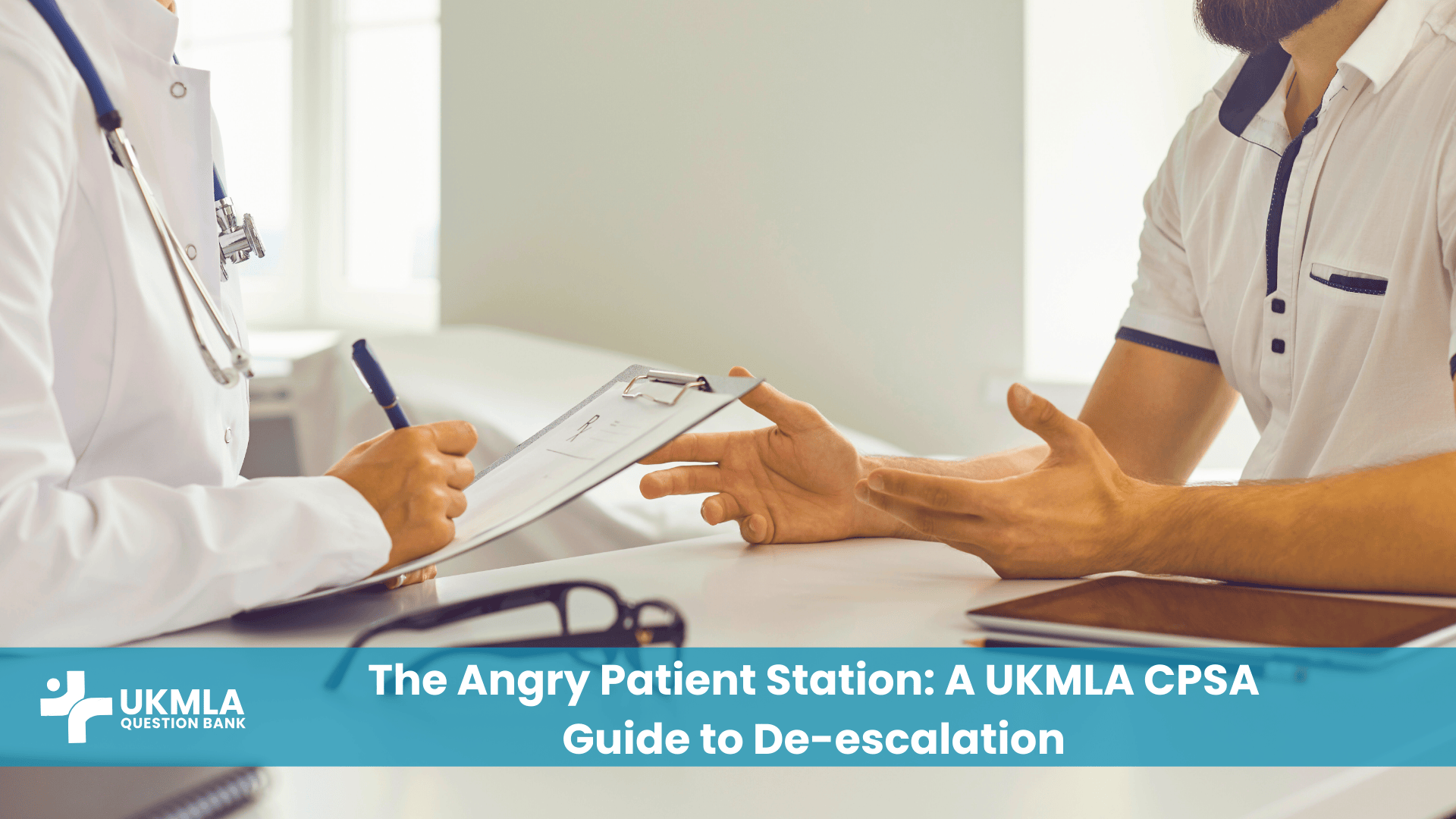Introduction
To succeed in the UK Medical Licensing Assessment (UKMLA), a sharp focus on what truly matters is essential. A core part of this is mastering high-yield sexual health ukmla topics, which feature heavily in both the Applied Knowledge Test (AKT) and the Clinical and Professional Skills Assessment (CPSA). This guide, your Sexual Health Essentials for UKMLA, provides a comprehensive, exam-focused overview of common STIs & patient management, building your confidence and competence for both the exam and your future practice as a UK doctor.
Table of Contents
ToggleYour Essential Guide to Common STIs and Patient Management for the Exam
Core Principles in Sexual Health Consultations
Success in sexual health scenarios goes beyond textbook knowledge. The UKMLA assesses your ability to practice safely and professionally. Adhering to core principles is fundamental and demonstrates your readiness for practice.
Ensuring Confidentiality and Building Patient Trust
Confidentiality is the cornerstone of any sexual health consultation. Patients are sharing highly personal information and must feel secure in the knowledge that their privacy will be respected. This involves conducting the consultation in a private setting and clearly explaining the limits of confidentiality (e.g., safeguarding concerns). Breaches of trust can deter patients from seeking necessary medical care in the future, a critical aspect of professionalism and patient safety.
The Importance of a Non-Judgemental Approach
Your personal values have no place in a clinical consultation. A non-judgemental and empathetic approach is essential for effective care. This means using inclusive language, being mindful of your tone and body language, and validating the patient’s concerns without expressing surprise or disapproval. Patients from diverse backgrounds and lifestyles will seek your help, and your ability to treat every individual with dignity and respect is a core tenet of good medical practice, aligning with key principles of medical ethics and law.
GMC Good Medical Practice Principle: “You must treat patients as individuals and respect their dignity and privacy. You must work in partnership with patients, listening to, and responding to, their concerns and preferences.”
Navigating UK & Global Guidelines
Evidence-based practice is paramount. For the UKMLA, you should be familiar with UK standards and globally recognized resources:
BASHH (British Association for Sexual Health and HIV): Produces detailed national guidelines that are the gold standard for UK specialist practice.
CDC (Centers for Disease Control and Prevention): Provides the globally respected STI Treatment Guidelines, an excellent and comprehensive resource for any doctor, including IMGs.
Being aware of these bodies is as important as knowing the treatments themselves.
High-Yield STIs: Key Features & Diagnosis
For the UKMLA AKT, you need to rapidly identify common STIs based on their classic presentations and know the appropriate investigations.
Chlamydia Trachomatis: Presentation & First-Line Investigations
Chlamydia is the most common bacterial STI in the UK. A significant feature is that it is often asymptomatic (in ~70% of females and ~50% of males), making screening crucial. When symptoms do occur, they include post-coital pain (dyspareunia), lower abdominal pain, and discharge. The gold-standard investigation is a Nucleic Acid Amplification Test (NAAT) from a vulvovaginal swab (VVS) or a first-catch urine sample.
Neisseria Gonorrhoeae: Symptoms & Gold-Standard Testing
Gonorrhoea is more likely to be symptomatic, classically presenting with a purulent (green/yellow) discharge. While a NAAT is used for diagnosis, a culture from the site of infection is also crucial. This is because of rising antibiotic resistance, and culture allows for antimicrobial sensitivity testing.
Syphilis (Treponema pallidum): Recognising the Stages & Interpreting Serology
Syphilis is known as “The Great Imitator.” You must know its stages: a painless ulcer (chancre) in the primary stage, and systemic symptoms like a rash on the palms and soles in the secondary stage. Diagnosis is via serology (a blood test).
Genital Herpes (HSV): Clinical Differentiation and Viral Swabs
Caused by Herpes Simplex Virus, the classic presentation is multiple, painful vesicles (blisters) or ulcers on a red base. Diagnosis is often clinical but can be confirmed with a viral PCR swab taken from the base of an active lesion.
Trichomonas Vaginalis: Classic Signs and Microscopy
This protozoan infection typically causes a thin, frothy, yellow-green, foul-smelling vaginal discharge. Diagnosis is often made via microscopy of a wet mount from a vaginal swab, which shows motile trichomonads.
Table 1: Summary of Common STIs for the UKMLA
| Condition | Organism | Key Clinical Features | Gold-Standard Investigation |
| Chlamydia | Chlamydia trachomatis | Often asymptomatic; discharge, PCB/IMB, dysuria | NAAT (VVS or first-catch urine) |
| Gonorrhoea | Neisseria gonorrhoeae | Purulent discharge, dysuria | NAAT + Culture for sensitivities |
| Syphilis | Treponema pallidum | Painless chancre (primary), rash on palms/soles (secondary) | Serology (blood test) |
| Genital Herpes | Herpes Simplex Virus (HSV) | Multiple painful blisters/ulcers | Viral PCR swab from lesion base |
| Trichomoniasis | Trichomonas vaginalis | Frothy, yellow-green, malodorous discharge | Wet mount microscopy / NAAT |
Evidence-Based high-yield sexual health ukmla Management
Correctly diagnosing an STI is only half the battle. You must know the current, evidence-based management strategies.
First-Line Antibiotic Regimens for Common STIs
Antibiotic choice is a common AKT question. You must know the first-line treatments as per UK guidelines.
Uncomplicated Chlamydia: Doxycycline 100mg twice daily for 7 days.
Uncomplicated Gonorrhoea: A single dose of Intramuscular (IM) Ceftriaxone 1g.
Trichomoniasis: Metronidazole 400mg twice daily for 7 days.
Remember to always check for allergies and contraindications (e.g., doxycycline is contraindicated in pregnancy). A core aspect of your learning should include reviewing knowledge on infectious diseases for the UKMLA more broadly.
Principles of Managing Pelvic Inflammatory Disease (PID)
PID is a serious upper genital tract infection in women, often a complication of untreated chlamydia or gonorrhoea. Key features are bilateral lower abdominal pain and cervical motion tenderness (“cervical excitation”). Management requires a broad-spectrum antibiotic combination, typically including IM ceftriaxone followed by oral doxycycline and metronidazole for 14 days.
Partner Notification: A Core Professional and Public Health Duty
Treating the patient is not enough; you must also address public health. Partner notification (contact tracing) is the process of informing sexual partners of their potential exposure so they can be tested and treated. This is a crucial conversation to have, explaining its importance in preventing reinfection and stopping onward transmission.
Mastering Communication: The CPSA Perspective
The CPSA will test your ability to apply your knowledge in a simulated clinical encounter. Your communication skills are paramount.
How to Take a Structured, Empathetic Sexual History
A good sexual history is essential for accurate diagnosis. Use a structured approach but maintain a conversational, empathetic tone. A great resource for refining this skill is the UKMLA history taking guide.
Key Tip: Start with open questions and normalising language. For example: “To make sure I’m giving you the best all-around care, I ask all my patients some questions about their lifestyle, including their sexual health. Is that okay with you?”
Explaining Diagnoses and Management Plans Effectively
Avoid medical jargon. When you have a diagnosis, explain it in simple terms, check for understanding, and allow questions. For example, instead of “You have Neisseria gonorrhoeae,” say “The tests show you have an infection called gonorrhoea. It’s very common and we can treat it effectively with an antibiotic injection.”
Counselling on Safer Sex Practices
Management extends beyond treatment. A key part of any sexual health consultation is providing advice on reducing future risk. This includes discussing condom use and regular screening. Frame this positively as part of empowering the patient to take control of their health. This proactive approach is a key component of providing high-yield sexual health ukmla care.
Special Considerations in Sexual Health
Some scenarios require specific knowledge and a nuanced approach.
HIV: Key Principles of Initial Testing and Post-Exposure Prophylaxis (PEP)
HIV testing should be offered routinely in many settings. You must know that a 4th generation blood test is the standard. Post-Exposure Prophylaxis (PEP) is a course of antiretroviral therapy that can prevent HIV infection if started within 72 hours of a high-risk exposure.
Managing STIs During Pregnancy
Managing STIs in pregnancy is critical to prevent harm to the fetus. Some treatments are contraindicated (e.g., doxycycline), so you must know the safe alternatives (e.g., azithromycin or amoxicillin for chlamydia in pregnancy). Untreated infections can have devastating consequences, highlighting the importance of antenatal screening.
Frequently Asked Questions (FAQ) about High-Yield Sexual Health for UKMLA
Screening involves testing asymptomatic individuals at risk to detect infections early. Diagnostic testing is performed on symptomatic individuals to confirm a suspected diagnosis.
While you must strongly encourage it, you cannot force a competent adult. Explore their reasons, address their concerns, and explain the risks of reinfection and onward transmission. Document the discussion clearly.
Yes, particularly in specialist clinics. It allows for the rapid diagnosis of conditions like trichomoniasis and bacterial vaginosis, and is used for Gram staining in suspected gonorrhoea.
Red flags include severe, unilateral lower abdominal pain (could be an ectopic pregnancy), fever (could be PID), and testicular pain (could be epididymo-orchitis).
PID is primarily a clinical diagnosis based on lower abdominal pain combined with cervical motion tenderness, uterine tenderness, or adnexal tenderness on pelvic examination.
HIV testing is voluntary and requires informed consent. Pre-test discussion covering the benefits, meaning of results, and the window period is essential.
Establish their competency to consent (Fraser guidelines). Reassure them of confidentiality and its limits (safeguarding). Use simple language and a non-judgemental tone.
Common mistakes include failing to establish confidentiality, using judgmental language, forgetting key risk factors, neglecting partner notification, and providing inadequate safety-netting advice.
A TOC is recommended for gonorrhoea due to antibiotic resistance. It’s also used for chlamydia in pregnancy and in rectal infections. It’s not routinely required for uncomplicated genital chlamydia otherwise.
UKMLA questions are less about obscure details and more focused on safe, practical management. They integrate knowledge with professional skills, asking what you would do or say next. This is the essence of assessing high-yield sexual health ukmla competence.
Conclusion
A thorough understanding of sexual health is non-negotiable for success in the UKMLA. By mastering the diagnosis and management of common STIs, embracing the core principles of professional practice, and honing your communication skills, you demonstrate your readiness to be a safe and effective UK doctor. Use this guide as a foundation, dive deeper into the guidelines, and practice applying your knowledge in clinical scenarios. Your diligence in this high-yield area will pay dividends not only on exam day but throughout your medical career.




